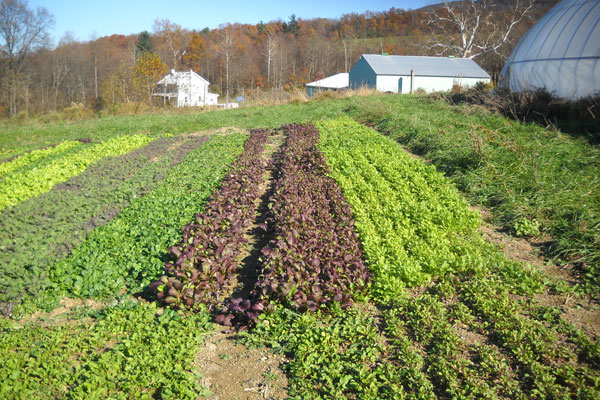-

Erin Donahue -

Christina Barkanic -

Brittany Trott -

Emily Wiley -

Jessica Reilley -

Chris Raines -

Will Nichols -

Emily Reddy -

Michele Marchetti -

Michele Frank -

James Gherardi -

Kit Henshaw -

Christina and Erin -

Kim Tait -

Erin McKinney -

Steve Spanelli -

Sam Komlenic -

Katherine Taylor Grofic -

James Eisenstein -

Jamie Oberdick -

Anna Lombardo -

LacCreta Holland -

Tony Ricci -

Local Food Journey -

Laura Young -

Kristin Camplese -

Harrison's Fresh + Local -

Danielle Matalonis -

Kristine A. -

Linda Weaver -

Naomi Elle Schwartz -

Dana Stuchul -

Cara McShane -

Brittany Smith -

Jessica Illuzzi - Frosty
-

Jessica Paholsky -

James Sechrengost -

Brad Yeckley -

Maya Althouse -

Jordan Reabold -

Kim Chase -

Maria Bryant - Alexandrea Scott
Weather Woes
Posted by James Eisenstein on 12/07, 2011 at 03:36 PM

Fall Greens thriving on a mid-November 2011 mild day at Jade Family Farm. Photo Credit James Eisenstein.
For most people, the weather gives us something to talk about besides religion and politics. Bad weather can produce gloom, glorious days joy, rainy spells inconvenience. But really, we live indoors and travel mostly in enclosed spaces, so life pretty much goes on regardless of the weather. Not so for folks who work outdoors. Bad weather means no work for roofers and tree trimmers. Rain means less pleasant work for garbage men and traffic police.
But for farmers, the state of the weather has profound consequences that most people are not even aware of. So read on and improve your comprehension of just what a huge impact the weather has on folks who grow your food.
Of course, since we work outdoors all the time, the effects of weather on working conditions are obvious. If you have Harvest Shares to deliver and a farmers market to attend, you need to harvest even if it is raining cats and dogs. And it’s more fun to spread manure in the fall if it isn’t 35 degrees with a 25-mile per hour wind. However, for farmers, the ramifications of too much or too little rain, too much heat or lots of cold, go far beyond physical comfort. They determine whether you make money (lots of luck with that), go out of business, or only lose less than what will bankrupt you.
What about this year? How well do you remember what the spring was like? What happened in June, July, August, and September? If your memory is a little dim, just ask a local farmer.
Our neighbor at Jade Family Farm, well into his social security years, said he could not remember a colder or wetter spring. It was impossible to get into the fields to work the ground, and when a few days respite allowed the ground to dry enough to seed, the rain came back and rotted seeds in the ground.
May was nice, but for many crops it was too late by then. June was way too wet. We didn’t have any rain in July, but at least it was hot enough to damage many crops. It was so wet in August and September that crops that usually thrive for us, like lettuce, were pounded apart. Tropical storm Lee washed out our driveway. One grower at the Hershey Farmers market lost everything, and an organic farmer we know had all of his valuable baby lettuce crop ruined by a freak spring hail storm. His sales to Tuscarora Organic Growers Cooperative were 10% of his 2010 sales. Do the math. That is down 90%. And two of the most experienced and successful organic growers we know said that this was the worst year they ever had.
Ah, but bad things don’t last forever. The last half of October and all of November were unusually mild, and we’ve been able to harvest some fall greens. And next year, things will be perfect. Right?
![]() Author: James Eisenstein
Author: James Eisenstein
Bio: Unpaid Field Hand at Jade Family Farm | Former Penn State Professor
- Our Local Food Journey comes to an end
- Winter isn’t a quiet time at the farm
- Get the taste of garden season right now by growing herbs indoors
- All you need to know about PASA’s Farming for the Future conference









NO COMMENTS